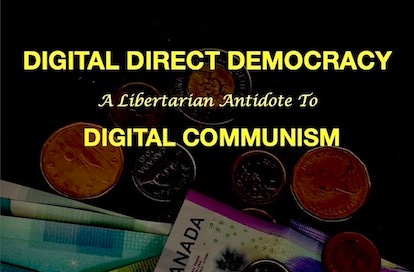Digital Direct Democracy, episode #5 __Realizing a Decentralized Vision__
Common sense is a powerful human faculty. Reason suggests that if you have too much of something, the prudent thing to do is to reduce it until a desireable balance is reached.
Does your ‘common sense’ agree?
The concept of democracy conjures images of a society in which citizens and property owners have the freedom to make informed choices about their person and property within reasonable limits.
Within this “civil society” framing, each person should be able to use their physical and mental resources to create material and intellectual assets, and to decide how to employ them. Whether a business owners (producer) or an individual citizen (consumer), their choices are best made voluntarily.
Coercion is unnecessary when fair and unbiased laws exist and are faithfully enforced to protect and defend every citizen from unwanted harm and aggression, even from those employed by the state.
On the road to serfdom.
Unfortunately, modern democracy rests on a precarious slope. The traditional notion of democracy, along with its implied and constitutionally defined rights and freedoms, is fading. The ever-growing expansion of public institutions and the responsibilities they undertake is both the cause and the result of this decline.
The size, cost, and scope of authority held by public institutions far exceed their optimal levels for serving citizens. Whenever "collective" solutions are prescribed for a nation of 40 million unique individuals, public services become increasingly bureaucratic, impersonal, costly, and inflexible as the adhere to a one-size-fits-all formula.
Digital Direct Democracy represents a shift toward a more agile, citizen-centric governance model. By embracing decentralization and leveraging digital advancements, we can reinvigorate the democratic spirit and ensure that institutions truly serve the people they represent.
Restoring Balance is the Goal.
As we all know, government planned and operated services play a significant role in current Western societies and their economies. In Canada, the purpose and scope of government responsibilities needs a thorough evaluation and restructuring both now and periodically into the future. Here are some ideas to consider for this endeavour.
Introduce competition selectively: What if governments only operated in service domains that could not be provided cost-effectively by non-government service providers? What if the acceptance of government-provided services, and their associated costs and compliance requirements, was optional for every citizen?
Restore Canadian dignity.Too many Canadians have come to expect governments to be “all things to all people from cradle to grave”. This leaves them reliant upon an unhealthy and costly bureaucratic quagmire. To restore Canadian dignity and the prospects for improving prosperity, everyone must recognize that this dependency has the insidious effect of reducing the resourcefulness, confidence and pride in personal responsibility for many.
Free choice prevents public overreach: To appreciate this claim, consider your own shopping experiences. Every Canadian has a lifetime of consumer experience in competitive markets such as food, entertainment, vehicles, and clothing/fashion. These sectors thrive without government ownership. Imagine if non-government service providers could compete in areas currently monopolized by the government, such as education. Competition would foster a decentralized, consumer-driven market that offers significant advantages to shoppers in terms of available choices, quality, price and convenience.
A better balance between the “collective” and the individual. What if government service providers had to ‘coexist & compete’ with non-government service providers under conditions where every citizen could choose to opt-out of the former, stop paying the associated taxes and use these savings to pay for the latter? The government planned and operated service providers would lose substantial market share unless they learned how to compete with the best. Over time, competitive market forces would find a new balance in market shares earned by the public and business players. Overall customer satisfaction will surely exceed that of the current government monopolies, and do so at lower costs to all citizens in a voluntary manner.
Are you skeptical of the Climate Change Crisis Theory?
Should everyone be forced to pay carbon taxes even if some don’t believe that tye alleged crisis exists?
In a true democracy that respects and honours the freedom of informed choice of every citizen, the Climate Change skeptics should be exempt from paying all forms of carbon taxes and, ideally, from forced compliance to related laws and regulation. Those citizens would never pay carbon taxes on gasoline or home heating fossil fuels if they were given a registered choice to opt-out.
The technology exists to design, develop, implement, secure and maintain an online repository of every citizen’s opt out choices. Let’s call it a Citizen Preferences Database (CPD) and pursue this concept to make freedom of informed choice a reality.
The CITIZEN PREFERENCES DATABASE.
The next episode will cover this concept in greater detail. However, it must be made clear that no politician or public official can have any involvement whatsoever. They are a class of citizen who often suffer from a pathological need to control services to the public which inevitably becomes a means to exploit citizens for self-serving purposes.
Public officials already have too many ways to monitor, control and tax citizens’ earnings and choices.
Blockchain technology, under a decentralized transaction approval mechanism like that used by Bitcoin, is the preferred choice to safeguard and secure CPD users from potential government or corporatist predatory behaviour.
Besides, if the ArriveCan scandal is any indication, governments are incompetent at managing large scale technology projects.





Gene, the current situation that exists in government is by design. This should not be surprising. Trudeau is following a play book like the good puppet he is ! The WEF is the puppet master. As long as the WEF have their tentacles in Canada, elected or civil servants, provincial and municipal politicians, health officials and educators are all suspect of their agenda. This is where the clean up has to start. Neither the Liberals or NDP can be trusted. PP, he has to be elected with a majority and his will to clean house must be strong.